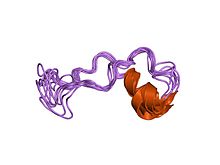Microcins
| Subtilosin_A | |||||||||
|---|---|---|---|---|---|---|---|---|---|

structure of Subtilosin A
|
|||||||||
| Identifiers | |||||||||
| Symbol | Subtilosin_A | ||||||||
| Pfam | PF11420 | ||||||||
| InterPro | IPR021539 | ||||||||
| TCDB | 1.C.84 | ||||||||
| OPM superfamily | 508 | ||||||||
| OPM protein | 1pxq | ||||||||
|
|||||||||
| Available protein structures: | |
|---|---|
| Pfam | structures |
| PDB | RCSB PDB; PDBe; PDBj |
| PDBsum | structure summary |
Microcins are very small bacteriocins, composed of a relatively few peptides. For this reason, they are distinct from their larger protein cousins. The classic example is microcin V, of E. coli. Subtilosin A is another bacteriocin from Bacillus subtilis. The peptide has a cyclized backbone and forms three cross-links between the sulphurs of Cys13, Cys7 and Cys4 and the alpha-positions of Phe22,Thr28 and Phe31.
It is found that these bacteriocins target and eliminate iron-starved pathogens, which is found specifically in an inflamed gut where the E. Coli strain prefer to thrive. Specifically, the protein targets the pathogens are producing iron-scavenging protein in response to a low iron environment. Researchers found. E. coli Nissle’s microcins killed diarrhea-inducing bacteria called Salmonella Enterica in the guts of infected mice. Microcins also helped Nissle outcompete a different, more virulent of E. coli found in the infected mice's guts.
BACTIBASE database is an open-access database for bacteriocins including microcins.
...
Wikipedia
